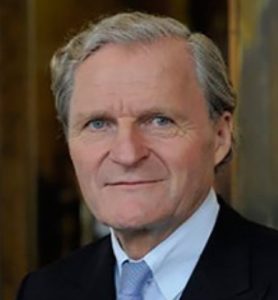
This is a story from ancient Rome that modern Britain seems to have forgotten.
More than 2000 years ago, a father once gathered his older boys around him. He gave them a bunch of sticks. He asked his sons to break the bunch. One after the other tried – but no one succeeded. Then the father took the bunch back, opened the ribbon around it and broke the sticks one after the other.
“Oh, that is easy, Daddy,” said one of the boys. “We could have done the same.”
The father replied: “Don’t forget, dear boys, that when you stand together, you are strong and nobody can harm you. But when you are alone, you are vulnerable.”
Churchill’s vision of Europe
If you go to Rome in the summer, you can see people drink from the public fountains which have been installed all over the city. If you take a closer look at the fountains, you will see a bunch of sticks and underneath the letters SPQR that stands for: senatus populusque romanus.
It’s an old story, but its conclusion is still valid today. At least for most of us: in Britain, the Roman father’s lesson doesn’t seem to resonate quite the same way.
After the end of World War II, Sir Winston Churchill was asked to deliver an address to students in Zurich. This was in 1946. He seized the moment to call for the unification of Europe. His “United States of Europe” were to include France and Germany. But Churchill made no mention of Great Britain.
America moving away
In 1946, England enjoyed a strong and close partnership with the United States of America. This may have been one of the reasons why Churchill saw no need to include England in the construction of Europe.
70 years later, we are seeing a far-reaching change in the demographics of the United States. Today, there are still about 50 percent of Americans whose ancestors emigrated from Europe. One quarter has African origins, and another quarter has roots in South America. But these percentages are shifting.
By 2050, Americans of European, African and South American origins will each make up a third of the population. Will there be anything left, then, of the alliance cordiale between the United States and Britain that existed in the middle of the last century? When you listen closely to the speeches of the U.S. presidential candidates, the shift is already happening.
Thinking in major dimensions and regions
Nevertheless, the UK voted to leave the European Union. On June 24, 2016, the British decided that their country would be better off outside the strictures of the EU. For example, the thought they could conclude better trade deals on their own.
Today, the British government is frantically looking to hire busy hiring trade experts. Apparently, about 1000 are needed for all the trade deals that now need to be negotiated. But even with all the experts in the world, what chance does a country with the limited economic and political weight of the UK alone have to get better deals than a trading bloc representing 500 million consumers?
We might as well imagine Luxembourg on its own, facing a fearsome trade power like China. Even Germany and France wouldn’t get far if they were on their own. In the future, we will have to think in major dimensions and regions.
After all, the story from ancient Rome teaches us that the unification of Europe is a great chance for all of us.
Dr. Jürgen George Brandt is a lawyer and member of the board of the Friedrich Foundation in Hanover


